Key Takeaways:
The cost to develop an EV charging app ranges from $10,000 to $250,000 or even more, depending on several key factors.
The key factors impacting the EV charging app development cost include the app features, hardware requirements, platform selected, app design, and more.
Several hidden factors also exist, including the maintenance charges, licensing fees, compliance requirements, and scalability investments.
The development cost of the EV charging app can be controlled through thorough planning, cross-platform development, avoiding heavy customization, and more.
EV charging app makes money through charging session fees, subscription plans, commissions, in-app promotions, and more.
Partnering with the right development partner can help you build a scalable EV charging app within the set budget.
The EV charging app plays an essential role in the widespread adoption of electric vehicles. These apps are not just meant to control the charging status of EVs, but are also meant to improve the user experience and offer them the convenience they expect.
Following such shifting requirements, the entrepreneurs and EV brands are investing in EV charging apps and other innovative ideas. But along with all, a key aspect to be concerned about is the return on investment from the EV app.
Every company planning for an EV app expects a profitable return out of it, and a key factor to be considered is the “Cost to develop an EV Charging app.” The cost helps the entrepreneur plan their monetization structure as well as potential revenue.
In this blog, we will discuss “How Much Does it Cost to build an EV Charging App?”, the associated aspects, the factors impacting such cost, and other factors you must be aware of.
Growing Market of EV Charging App
The EV charging industry is scaling rapidly, and hence, more entrepreneurs are looking for ways to enter the space. But a key aspect to be worried about is the Electric charging app development cost, which varies based on several factors.
Hence, it is important to have a detailed industry understanding and accordingly decide your affordability for the electric vehicle charging app development cost.
-
The global electric vehicle charging app market is projected to exceed USD 255,218.5 million by 2033 at a CAGR of 40% approximately.
-
There are more than 3.5 million EV charging stations globally by 2025, which is just raw data, and new stations are being added to the list to align with the increasing EV demand.
-
More than 85% of EV users make use of the charging apps to find nearby stations, check charging status, and perform other key actions.
-
There exist more than 50 EV charging apps by EV manufacturers and other third-party players that aim to ease the charging infrastructure for users.
These factors are just an indication of how the EV charging app market is also expanding along with the rise in the number of EVs sold each passing day. So, if you are planning to build an EV charging app, then this is the right time to proceed.
How Much Does It Cost To Create An EV Charging App?
The cost to build an electric vehicle charging app ranges from $10,000 to $250,000 or more, which varies depending on the app complexity, features offered, and other factors.
An EV charging app with basic features like controlling the charge on/off can cost from $10,000 to $25,000, as it has basic screens and limited functionality. On the other hand, the cost to build a mobile app with advanced features can reach up to $250,000 or even more.
EV Charging App Cost Breakdown:
|
Component |
Details Covered |
Estimated Cost Range |
|
App Design (UI and UX) |
Wireframes, user flow, charger map screens, booking screens |
$2,000 – $15,000 |
|
User App Development |
Charger search, booking, navigation, payments, and session tracking |
$8,000 – $60,000 |
|
Charger Management Dashboard |
Station monitoring, load insights, pricing controls, and user management |
$10,000 – $45,000 |
|
Backend and API Development |
OCPP integration, charger control APIs, cloud backend |
$12,000 – $70,000 |
|
Payments Integration |
Wallets, cards, coupons, usage reports |
$1,500 – $10,000 |
|
Smart Features |
Smart routing, dynamic pricing, AI predictions, energy-use analytics |
$5,000 – $40,000 |
|
Roaming (Hubject, Gireve) |
EV roaming setup, contract integration |
$8,000 – $50,000 |
|
Admin Panel |
Reports, revenue dashboard, analytics |
$3,000 – $20,000 |
|
Testing and QA |
Performance, device testing, charger communication tests |
$2,000 – $15,000 |
|
Cloud Hosting & DevOps |
Deployment, monitoring, load management, CDN |
$1,000 – $8,000 annually |
|
Maintenance |
Fixes, feature updates, API upgrades |
$500 – $5,000 per month |
Factors Affecting The Cost to Build An EV Charging App
The cost to make an EV Charging app depends on several key factors. These factors define how your app will perform, serve users, and scale in the long run.
Let’s focus on the key factors affecting EV Charging app cost.
1. App Features and Complexity
Building a basic EV charging app with nearby charger search and booking is affordable and costs less. But the development cost of an EV Charging app goes up when you plan for additional features, including live charger status, payments, smart routes, or usage reports.
|
Feature Level |
What It Covers |
Cost Impact |
Estimated Cost |
|
Basic Features |
Nearby charger search, booking, simple profile |
Low |
$10,000 to $25,000 |
|
Core Features |
Live charger status, payments, usage reports, pricing rules |
Medium |
$25,000 to $60,000 |
|
Advanced Features |
Smart routes, alerts, energy insights, dynamic pricing engine |
High |
$60,000 to $120,000 |
2. OCPP and Hardware Integration
OCPP is a standard in the EV charging space, and hence, trusted EV charging apps need support for OCPP chargers. But the apps that work with OCPP 1.6J or 2.0.1 need extensive backend setup, resulting in increased cost to build an EV Charging app.
Further, costs increase when you add support for fast chargers, ISO 15118, Plug and Charge, or load balancing because these need advanced testing, but improve the overall app performance.
|
Integration Level |
Technical Scope |
Cost Impact |
Estimated Cost |
|
Standard OCPP 1.6 JSON |
Start and stop session, meter data |
Low |
$5,000 to $15,000 |
|
Full OCPP 1.6J Support |
Remote control, reservation, firmware updates, charger diagnostics |
Medium |
$15,000 to $35,000 |
|
OCPP 2.0.1 + ISO 15118 |
Plug and Charge, certificate handling, fast DC charger support, load balancing |
High |
$35,000 to $60,000 |
3. Platform Selection
The selection of a platform further impacts the EV charging app development cost. You can plan for native apps for Android and iOS, or you can invest in a cross-platform app development that works across platforms.
Building for one platform is cheaper. But if you want separate apps on every platform, i.e., iOS, Android, and web, then the cost will be higher. However, adopting cross-platform development can offer the middle ground while ensuring cost efficiency.
|
Platform Option |
Technical Scope |
Cost Impact |
Estimated Cost |
|
Single Native App |
Only Android or only iOS |
Low |
$8,000 to $25,000 |
|
Cross-Platform App |
One codebase for Android and iOS using Flutter or React Native |
Medium |
$12,000 to $35,000 |
|
Dual Native Apps + Web Panel |
Android, iOS, and operator web dashboard |
High |
$35,000 to $100,000 |
4. UI and UX Design
Another factor affecting EV Charging app cost is the mobile app design. Simple or basic screens with only the essential features cost less.
But adding custom maps, clean booking steps, and operator dashboards costs more because they require more design work. Investing in design increases the cost, but it helps users find chargers faster.
|
Design Level |
Technical Scope |
Cost Impact |
Estimated Cost |
|
Basic UI |
Simple screens, essential UI flow |
Low |
$2,000 to $8,000 |
|
Custom UI |
Custom maps, smooth booking steps, and charger icons |
Medium |
$8,000 to $18,000 |
|
Advanced UI + Dashboards |
Real-time maps, session timeline, operator dashboards |
High |
$18,000 to $30,000 |
5. Backend and Cloud Setup
If you are looking for “How much does it cost to create an EV Charging App?” then you should check for the backend and cloud setup.
The basic EV apps might not require a high-end backend and cloud setup. But moderate or advanced apps with features like live charger status, booking history, and more require a strong backend to keep the data safe and process it in real time.
The costs further rise when you want real-time updates or support for a large charging network, as it requires a larger cloud database and processing capabilities that add to the total cost.
|
Backend Level |
Technical Scope |
Cost Impact |
Estimated Cost |
|
Basic Backend |
Simple bookings, user accounts |
Low |
$5,000 to $20,000 |
|
Real Time Backend |
Live charger status, logs, and booking history |
Medium |
$20,000 to $45,000 |
|
Scalable Backend |
Large network support, auto scaling, and real-time events |
High |
$45,000 to $90,000 |
6. Third Party Integrations
The EV charging app requires several third-party integrations. Such integrations support the map tools, payment systems, wallets, and other operations. Hence, these integrations come with associated costs that need to be considered.
Further, roaming platforms like Hubject or Gireve increase the overall cost. Also, each integration needs a separate setup and testing. Hence, this needs to be planned thoroughly before investing.
|
Integration Type |
Technical Scope |
Cost Impact |
Estimated Cost |
|
Basic Integrations |
Map tools, simple location search |
Low |
$1,500 to $8,000 |
|
Payments and Wallets |
PCI-compliant payments, wallet top-up, and an invoice system |
Medium |
$5,000 to $20,000 |
|
EV Roaming Platforms |
Hubject, Gireve setup, roaming contracts, CPO, and eMSP sync |
High |
$12,000 to $40,000 |
7. Security and Data Protection
Mobile app security is one of the most important aspects to focus on. As EV apps handle payments and location data, features like encryption, secure login, and fraud checks are a must.
Adding these features results in increased Electric Vehicle Charging app development cost, but it keeps the app safe and builds trust among the users. Hence, you need to thoroughly plan and decide on the security level essential for your app.
|
Security Level |
Technical Scope |
Cost Impact |
Estimated Cost |
|
Standard Security |
Basic encryption, simple login |
Low |
$1,000 to $5,000 |
|
Enhanced Security |
Fraud checks, multifactor login, secure payments |
Medium |
$5,000 to $15,000 |
|
Advanced EV Security |
Plug and Charge certificate handling, advanced audits |
High |
$15,000 to $30,000 |
8. Team Expertise and Development Region
The cost to develop an Electric vehicle charging app also depends on the team you work with. A team from an experienced mobile app development company in the UK or the USA will charge more compared to a team from Asian countries.
But along with such a location, the team's expertise, knowledge, and time required to build the app vary. Hence, you need to plan strategically before making any decision.
|
Team Region / Expertise Level |
Technical Scope |
Hourly Rate |
Estimated Cost Impact |
|
Asia (India, Vietnam, Philippines) |
General mobile skills, basic EV features, standard API work |
$18 to $50 per hour |
Low |
|
Eastern Europe (Poland, Ukraine, Romania) |
Strong API work, good EV app understanding, reliable delivery |
$25 to $60 per hour |
Medium |
|
UK / Western Europe |
Skilled EV teams with experience in OCPP, backend scaling, and energy-based systems |
$60 to $130 per hour |
Medium to High |
|
USA / Canada |
Specialized teams for OCPP 2.0.1, ISO 15118, fast charger support, and enterprise builds |
$90 to $150+ per hour |
High |
Hidden Factors Impacting the Cost To Develop an EV Charging App
Some EV charging app development costs stay hidden during the planning stage and even in initial operations. But they later show up as the project scales.
These can increase the total budget or impact the operations if not planned early. Here are the common hidden factors affecting EV charging app cost you should know.
1] Handling Charger Firmware Differences
Each EV car brand follows its own firmware rules when it comes to the charger. Even if two chargers support OCPP, they may still need extra tuning to work well with the app.
Hence, as your app scales, you need to improve your app compatibility to diverse charger firmware. These changes take more development time and more testing, which increases the cost to make an EV charging app.
2] Extended Testing Requirements in Low Network Areas
You can start your EV charging business in regions with better network and connectivity. But to scale your business, you need to expand into low-network areas.
But when you expand to such a region with low signals, the app requires extra testing to handle slow responses or limited network strength. This includes retry logic and offline screens. These extra test cases increase the overall QA effort and cost.
3] Data Storage and Log Retention
Another hidden cost aspect to be aware of is the data storage and log retention. The charging sessions create a steady flow of data. This includes meter readings, payments, and usage logs.
Further, as the user scales, the data load increases, and storing this data for long periods increases cloud storage costs. Some regions also need long-term records, which adds more load on the backend, while following the best security practices, and hence increases the planned cost to develop an electric vehicle charging app.
4] Map Accuracy and Charger Pin Updates
Further, the app needs to keep charger pins accurate and updated. These live updates for charger status and availability increase backend activity.
Along with the backend activity, this also raises server load and API usage. It also needs more syncing in the frontend, which increases the cost to create an EV charging app.
5] Payment Dispute Handling
Some charging sessions may fail or end too early; in such cases, the users can generate refund requests. Hence, handling such unexpected payments and building a smooth system that checks session data and processes refunds takes extra backend work.
This also requires added payment logic, which increases the setup and development cost of an EV Charging app.
6] Compliance With Local Billing Rules
Different regions follow different energy units and tax rules. Your initial setup can be from a region you are familiar with, and accordingly, the compliance can be defined.
But as your app scales, it needs to expand into diverse regions, and hence needs to comply with and align with the country-specific norms, such as the US app norms. Adding these rules increases backend effort and also requires more testing to make sure billing stays accurate.
These additional efforts result in increased cost and impact the overall budget.
7] Customer Support Concerns
Providing real-time support to customers is non-negotiable, and hence, relevant investments need to be made. The users can have several issues, from facing charging inaccuracies to issues with the app or payments.
Hence, adding chat support or a ticket system helps solve problems faster. But these tools need extra coding and regular updates. Also, chatbot integrations and more are the key factors affecting EV Charging app cost.
8] Planning for Future Scalability
As your charger network grows, the app needs to handle more users and more charging sessions. Hence, maintaining such a scale, there is a need for a solid backend.
Scaling the backend early reduces future issues, but increases the initial cost to build an EV charging app. You need to invest in stronger servers, better caching, and more load control.
Tips to reduce the cost of EV Charging App Development
If you are concerned about “How Much Does it Cost to Develop an EV Charging App?” and are looking for ways to control the cost, then you should check out the tips mentioned below.
The mentioned tips can help you reduce the cost of building an EV charging app with the right planning and smart choices.
► Start With a Clear Feature List
When building an EV charging app, start by planning the most important features first. Keep the app simple during the first version. Also, plan for the advanced features to be added later when the app scales. This helps set a clear budget and plan for considerations from the start.
► Choose Cross-Platform Development
Instead of building separate apps for different platforms, choose a cross-platform framework like Flutter or React Native. One codebase works on both iOS and Android. This cuts the development time and reduces the overall development cost of an EV Charging app.
► Use Standard OCPP Integrations
Rather than adopting custom commands in the early stages, use standardized OCPP features that work well with most chargers. This reduces backend work and limits unexpected integration issues, and controls the cost to make an EV Charging app.
► Avoid Heavy Custom Design
Keep your app screen clean so that it loads faster and can offer what the user expects. Further, based on the user’s feedback, the UI can later be improved. This helps you stay within your budget and still deliver a smooth experience.
► Reuse Existing Tools and APIs
The best way to control the electric vehicle charging app development cost is by using ready solutions for maps, payments, and notifications. These tools save development hours and reduce testing time. They also improve app stability since they are already tested and trusted.
► Work With an Experienced EV App Team
A skilled team understands the EV charging flow, OCPP, and backend setup. Hence, planning to hire dedicated developers can help move faster and avoid mistakes that cost more later. Hiring the right team helps you build a reliable app within your budget.
How EV Charging Apps Make Money?
The cost to build an electric vehicle charging app varies depending on the project goals and expectations. But along with focusing on such a cost aspect, it is also important to plan and look at how EV charging apps make money.
1. Charging Session Fees
The EV charging apps earn a small fee each time a user starts a charging session. Some platforms have fixed fees, whereas some charge users based on energy use. Such helps recover the EV charging app cost.
2. Subscription Plans
These apps can earn through the subscription model. The apps can offer premium services for users, like faster support, charger reservations, or lower charging rates in against for a subscription. These monthly or yearly plans create a recurring income for the EV app.
3. Commission From CPOs
The EV charging app allows charging point operators (CPOs) to list their stations on the app. Once these operators are listed, they can get better visibility, and the app earns a commission for every session booked through the platform.
4. Ad Placement and Partner Deals
Another way to monetize the EV charging app is by showing ads. Such ads can be from energy brands, EV companies, or accessories, all those that are not your direct or indirect competitors. They also earn through partner promotions inside the app.
5. In App Promotions
The charging operators can promote their stations inside the app. Such listings can help the charging operators get better visibility, and the app can earn more money through these promoted listings.
6. Data Insights
The apps with a scalable user base can share anonymous usage data with energy firms or other leading players. Such data sharing allows the app to get an alternative revenue source. But such data sharing should be done ethically and as per the set norms.
How JPLoft Can Help Control EV Charging App Development Cost?
JPLoft can help you control the EV charging app development cost by planning the project in a smarter and structured way. The team of developers at JPLoft starts by helping you choose the most important features, avoiding unnecessary efforts and reducing back-and-forth changes.
Our team also guides you with the right tech approach. We ensure that every recommendation offered fits your goal, whether you are planning for a single platform development or cross-platform development. We also use standard OCPP methods that work well with most chargers. This cuts down the time needed for hardware integration and lowers the backend cost.
As a leading EV charging app development company, JPLoft helps with both custom development and integrating trusted third-party tools for maps, payments, and alerts. These ready options save development time and help the app run smoothly from day one. We also set up a backend that can grow with your network, so you only pay for extra server power when you truly require it.
With our strong experience in EV apps and charging systems, we help you avoid common mistakes and keep development fast, clean, and cost-efficient.
Conclusion
The blog defines “How much does it cost to build an EV charging app?” and the associated factors. The cost ranges from some thousand to several hundred thousand dollars or even more, depending on your app requirements and set expectations.
Also, there are several factors that define the final development and ongoing cost of an EV charging app. Hence, the EV app development must be planned strategically from its inception.
Look for key app features, the tech stack, relevant APIs, and integration, as well as the long-term scalability of the app. Along with these, it is also important to look for some hidden costs associated not only with the development but also with the regular operations.
The best approach can be to partner with experienced developers, who better understand the EV charging space and can assist you accordingly.
FAQs
The cost to build an EV charging app starts from $10,000 for a basic version and can reach $250,000 or more for an advanced app with smart features, real-time updates, and OCPP integrations.
The cost increases when you add features like live charger status, smart routing, dynamic pricing, roaming, advanced dashboards, and OCPP 2.0.1 support. These need extra backend systems and more testing.
A basic EV charging app takes around 8 to 12 weeks. A mid or advanced app with more screens, a stronger backend, and hardware integration can take 4 to 8 months, depending on the scope.
When searching for the right partner, look for a team with proven EV charging app experience, strong OCPP knowledge, and the ability to build scalable backends. Check their past work, tech skills, and support options before you start the project.
Yes, cross-platform development helps you build one app for both Android and iOS. It lowers development time and reduces maintenance costs, which makes it a budget-friendly choice for early-stage projects.





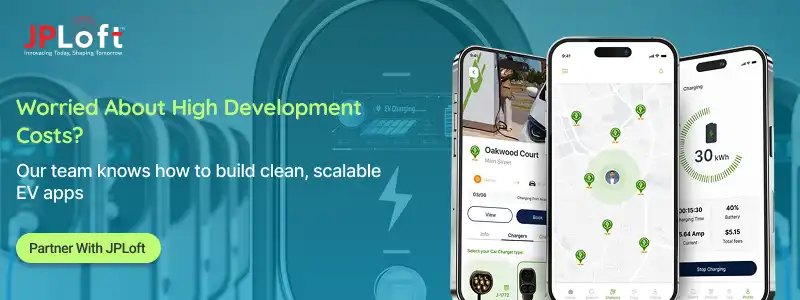
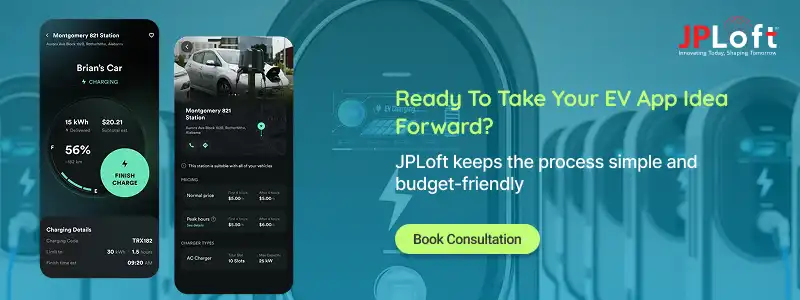

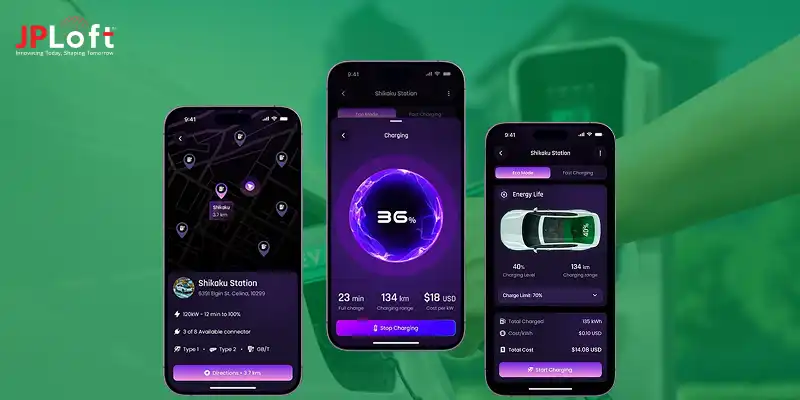
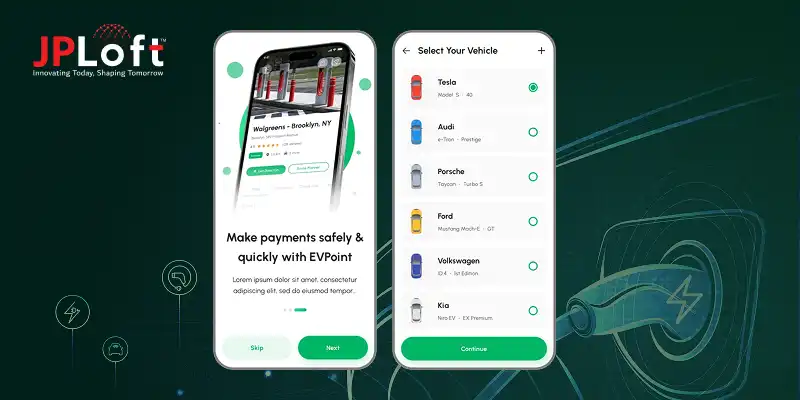
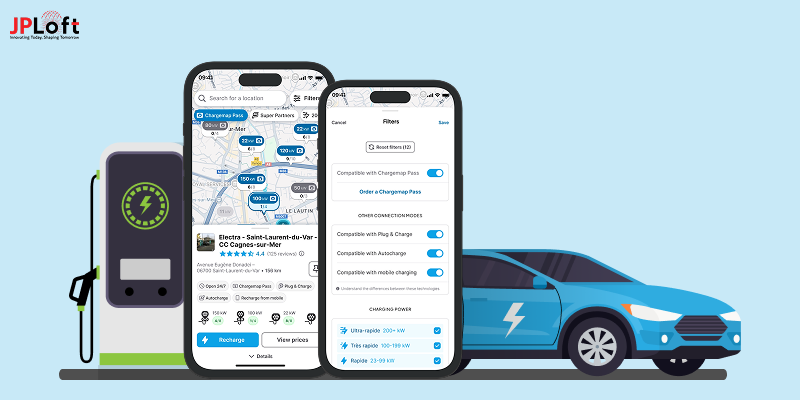


Share this blog